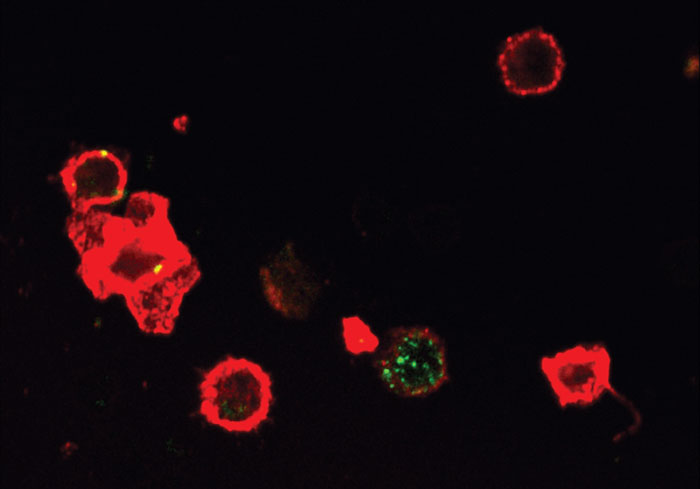
A research team at the University of Louisville has discovered that an immune checkpoint molecule they developed for cancer immunotherapy also protects against future development of multiple types of cancer when administered by itself.
The recombinant protein molecule SA-4-1BBL has been used to enhance the therapeutic efficacy of cancer vaccines with success in pre-clinical animal models. It accomplishes this by boosting the effectiveness of CD8+ T cells, adaptive immune cells trained to target the tumor for destruction. Surprisingly, when the researchers treated normal healthy mice with SA-4-1BBL alone, the mice were protected when the researchers later exposed them to different types of tumor cells.
“The novelty we are reporting is the ability of this molecule to generate an immune response that patrols the body for the presence of rare tumor cells and to eliminate cancer before it takes hold in the body,” said Haval Shirwan, professor in the UofL Department of Microbiology and Immunology and the UofL Institute for Cellular Therapeutics. “Generally, the immune system will need to be exposed to the tumor, recognize the tumor as dangerous, and then generate an adaptive and tumor-specific response to eliminate the tumor that it recognizes. Thus, our new finding is very surprising because the immune system has not seen a tumor, so the response is not to the presence of a tumor.”
The researchers have determined that the molecule generates a tumor immune surveillance system through activation of what are known as CD4+ T cells and innate NK cells, thereby protecting the mice against various cancer types they have never had. The function is an indication of the molecule’s effectiveness in cancer immunoprevention.
“Just giving SA-4-1BBL alone prevents the formation of tumors in animal models,” Shirwan said. “To our knowledge, this is the first study to demonstrate that an immune checkpoint stimulator, known for its function for adaptive immunity, as a single agent can activate an immune system surveillance mechanism for protection against various tumor types.”
Although the research, which was conducted in collaboration with FasCure Therapeutics LLC, tested the mice for cervical and lung cancers, the protective function of SA-4-1BBL works without context of specific tumor antigens, giving it the potential to be effective in preventing any number of tumor types.
“We are very excited about the cancer immunoprevention possibilities of this molecule. Its effectiveness is not tumor specific, and as a natural ligand, it does not cause toxicity, as is found with 4-1BB agonist antibodies. Plus, the fear of autoimmunity is highly minimized, as evident from our data, because it is activating the innate immune cells,” said Esma Yolcu, associate professor at UofL and co-author of the study.
“Although the notion of cancer immunoprevention is an attractive one, the design of clinical trials presents a challenge with respect to the target population,” Shirwan said. “However, with advances in cancer screening technologies and genetic tools to identify high-risk individuals, we ultimately are hoping to have the opportunity to test the SA-4-1BBL molecule for immunoprevention in individuals who are predisposed to certain cancers, as well as in the presence of precancerous lesions.”




















Add Comment